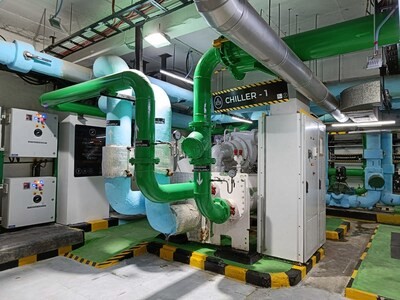
India's Cooling Revolution: A Proactive Approach to Sustainable Cooling at COP28
5 December 2023
In the face of intensifying climate change impacts, India has embarked on a transformative journey toward sustainability with its India Cooling Action Plan (ICAP). As heatwaves claim lives across 20 states, India's commitment to implementing this action plan becomes more crucial than ever.
Tackling the Challenge of Rising Cooling Demand:
With a population exceeding 1.3 billion, India faces an unprecedented surge in the demand for cooling driven by scorching heatwaves and rapid urbanization. A paradigm shift in cooling technologies is imperative, and the need for efficient and sustainable solutions has become paramount. Conventional cooling methods reliant on fossil fuels contribute to a significant energy footprint. This exacerbates strain on the energy grid, resulting in higher carbon emissions and worsening the greenhouse effect. India aims to pioneer sustainable cooling solutions, reducing both energy consumption and environmental impact.
Adopting Heat Pump Technology: A Beacon of Energy Efficiency:
At the forefront of India's cooling revolution is the adoption of heat pump technology, a beacon of energy efficiency. This innovation utilizes renewable energy sources such as solar and wind power to provide cooling solutions. By embracing this technology, India positions itself as a global trailblazer in combating climate change. India's recent announcement at COP28 solidifies its commitment to sustainable cooling. With a proactive stance on climate initiatives, India pledges to lead by example, setting ambitious targets to curb carbon emissions associated with cooling technologies.
Key Pillars of the India Cooling Action Plan (ICAP):
The ICAP outlines a comprehensive strategy with five key pillars:
1. Reduce cooling demand: Implementing energy efficiency measures in buildings, appliances, and industrial processes to minimize cooling needs.
2. Transition to sustainable refrigerants: Shifting away from high-global warming potential (GWP) refrigerants to low-GWP alternatives that minimize environmental impact.
3. Enhance energy efficiency in cooling technologies: Promoting the adoption of energy-efficient cooling technologies, such as heat pumps, to reduce energy consumption.
4. Strengthen institutional and regulatory frameworks: Establishing robust policies, standards, and guidelines to support sustainable cooling practices.
5. Raise awareness and capacity building: Educating the public, industry, and stakeholders on sustainable cooling options and promoting behavioral changes.
Impact of the India Cooling Action Plan:
The ICAP is expected to have a significant impact on India's cooling sector, including:
A reduction in cooling energy consumption by 25-40% by 2037-38.
A decrease in refrigerant demand by 25-30% by 2037-38.
Mitigation of up to 2.5 gigatons of CO2-equivalent emissions by 2037-38.
Improved energy security and reduced reliance on fossil fuels.
Enhanced thermal comfort and well-being for all Indians.
A Path Towards a Cooler, More Sustainable Future:
India's Cooling Action Plan emerges as a beacon of hope amidst escalating heatwaves and growing cooling demands. By prioritizing sustainable solutions and championing heat pump technology, India stands at the forefront of the battle against climate change. As the nation takes a leadership role at COP28, the world looks to India for inspiration and guidance on the path to a cooler, more sustainable future.